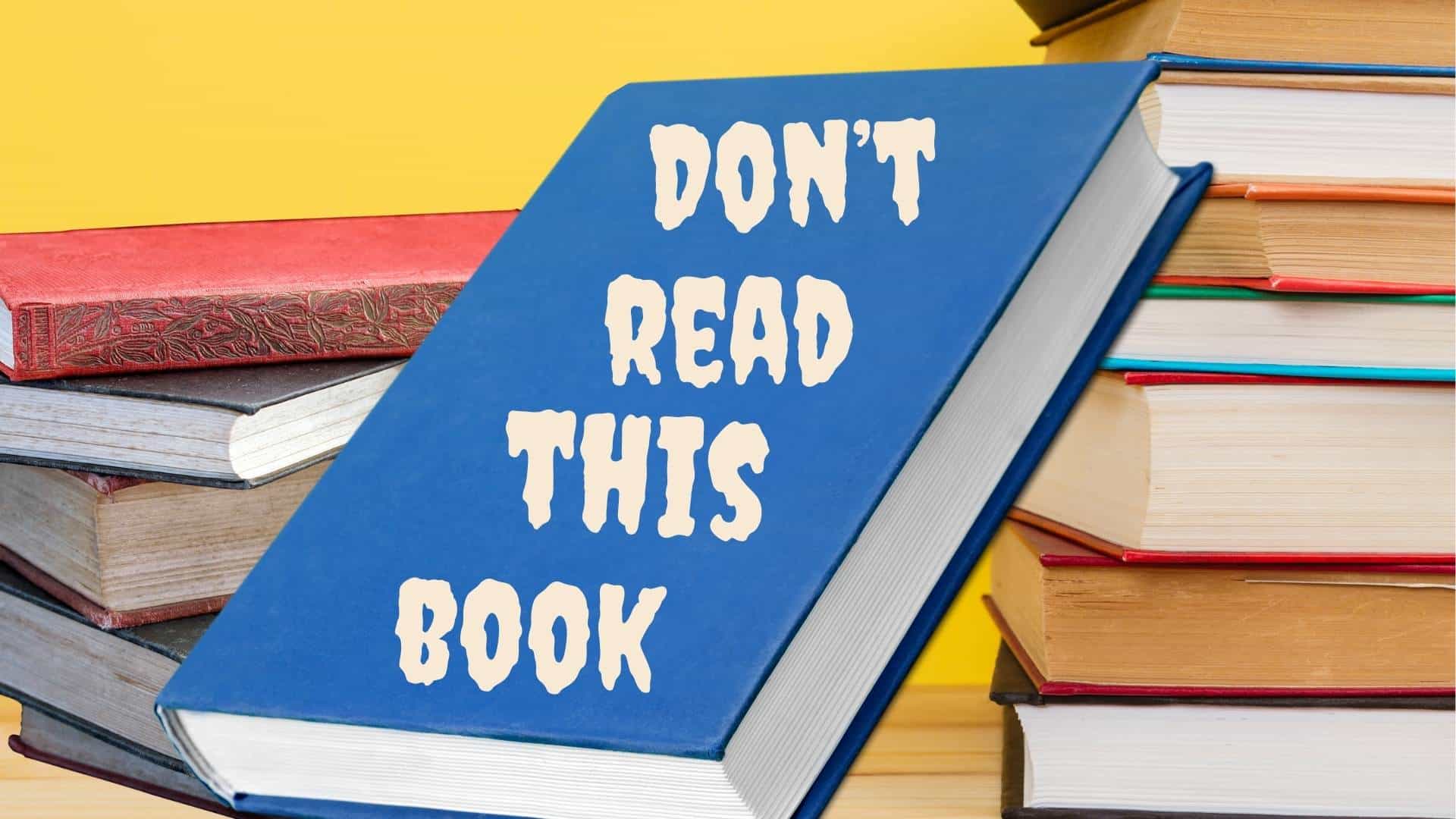Curling up with a good book is a basic pleasure. But these days doing just that might be a political statement.

A book on a shelf comes with a warning. (Illustration by News Decoder)
This article, by high school student Alexa Taras was produced out of News Decoder’s school partnership program. Alexa is a student at The Hewitt School, a News Decoder partner institution. Learn more about how News Decoder can work with your school.
When Amanda Gorman stepped onto the stage at U.S. President Joe Biden’s 2021 inauguration and read “The Hill We Climb,” her voice of hope and unity resonated across the world to millions of individuals. And at just 22, she was the youngest inaugural poet in U.S. history. Her words were carved into a pivotal moment.
But within two years, the same poem was censored in a Florida grade school after just one complaint from a parent. Gorman was stunned. “It hit me so incredibly hard,” she told NBC News. “It was a moment in history that if a child at that school wanted to hear words that were spoken at a presidential inauguration for their country, it had been softly restricted.”
This wasn’t about any one poem. It was about what its removal stood for.
Across the United States, book bans have been increasing more than 200% this year alone — particularly books that deal with race, gender or queerness. Although not usually labeled as “bans,” the effect is the same: books are disappearing from shelves, classrooms and public discussion.
This quiet purging of books is more than a cultural controversy. It’s becoming a political instrument and part of a dismantling of the U.S. Department of Education (DOE), which has historically been tasked with providing schools with resources and ensuring that they don’t discriminate.
A government okay with censorship
On 24 January, the Office For Civil Rights in the U.S. Department of Education rejected complaints that certain books, including those that were considered inappropriate or sexually explicit, were being removed from schools. The position of a “book ban coordinator” in the DOE, a position that was established to advise schools on civil rights issues about book removals, was eliminated by this ruling.
The DOE argued that school districts have put in place sensible procedures for identifying and eliminating age-inappropriate content after consulting with parents and community members, and the Office for Civil Rights has no say in these issues since they are a matter of community and parental judgment rather than civil rights.
The new policy allows schools to remove specific books without facing federal opposition.
Julie Matysik is the editorial director of Running Press Kids, a children’s book division of the Hachette Book Group. Her company publishes books for children centered around themes of gender identity and gender equality. Censorship, Matysik said, limits the way children see themselves and the experiences they have in books. Authors and publishers are fighting back, she said.
“[I’m] happy to see that the type of books and the way that the books are written are not being changed by authors,” Matsyik said.
Closing off access to knowledge
By removing the system in place that handled book complaints by parents and communities, the U.S. government is permitting the restriction of students’ access to learning about basic themes in life and historical moments in time. It seems to be part of an overall dismantling of the DOE.
Authors of some books that are the target of book bans argue that stories about women, people of color and about gender identity were censored in the past and the books now simply bring those stories to light.
Consider the book “I Am Not Your Muse” by Lori Zimmer and Maria Krasinski, about great women whose accomplishments in art, literature and architecture were overshadowed by their male partners. Krasinski, who illustrated the book, is the managing director of News Decoder.
Zimmer said the their book is supposed to be positive. “Women are half the population,” Zimmer said. “We do stuff, too.” While their book is too new to have caught the attention of book banners, Zimmer has been surprised at how little attention it has gotten.
“ This is our third book together for Maria and I, and this is the first one that we’ve got the least amount of press for, which is surprising considering it is Women’s History Month,” Zimmer said. “So generally, we thought it would be a shoo-in and we would be on every single list [for Women’s History Month] and we’re getting a lot of nos.”
But instead of discouraging Zimmer, she said that she feels more determined.
“I feel empowered to push it even further, because if you’re going to erase this very uncontroversial part of history or attempt to, then I’m going to just shout it louder,” she said.
Hearing different narratives
This is a powerful reminder that the fight for recognition and representation must continue despite censorship and marginalization.
Authors like Zimmer and Krasinski, as well as voices like Amanda Gorman and Julie Matysik, draw attention to the practical repercussions of choices schools and libraries make, not only for writers and educators but also for the students who are being denied access to a variety of narratives and factual historical accounts.
Zimmer said that the point of the Muse book was to revive the reputations of incredible women whose stories were ignored by historians. “The writers of history just decided to leave them out,” Zimmer said. “And a lot of men swooped in and took credit for [their achievements].”
Some people are threatened by this type of reexamination, she said. “It’s not that far in the past, it’s happening now, so it’s framed as a history book, and it’s supposed to be inviting and informative, but it’s seen as a threat, that kind of information.”
As a current student and aspiring writer, I fear that in the future I will be creating books that cannot exist in the educational system. Students deserve the right to learn about history no matter how violent or scary. How can we inspire students to be the best they can, if their education has been censored to only learn about ‘safe’ topics? Education should not be limited.
Zimmer said that aspiring writers have to continue to push forward. “Because if you censor yourself because you’re afraid of reaction, you’re helping to normalize that there should be censorship,” she said.
The views and citations expressed by this student journalist are their own and not those of their school or any person or organization affiliated or doing business with their school.
Questions to consider:
1. Why would a parent want to limit what a child could read?
2. What difficulty could book bans cause for a school?
3. At what age do you think someone should have total freedom to read?

Alexa Taras is in her fourth year at The Hewitt School in New York City. She spends her personal time volunteering as an assistant teacher at her synagogue and playing tennis. In school, she is an active member of Model UN and varsity soccer.
